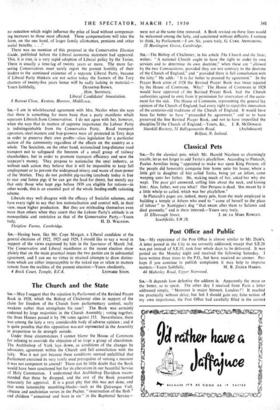SIR,—I am in wholehearted agreement with Mrs. Naylor when she
says that there is something far more basic than a party manifesto which separates Liberals. from Conservatives. I do not agree with her, however, when she says that in matters of supreme importance the Labour Party is indistinguishable from the Conservative Party. Road transport operators,,steel masters and hop-growers were all protected in Tory days in order to preserve their own profits—class legislation for a particular section of, the community regardless of the effects on the country as a whole. The Socialists, on the other hand, nationalised long-distance road transport not to safeguard the Interests of a small group of railway shareholders, but in order to promote transport efficiency and save the taxpayer's money. They propose to nationalise the steel industry, as without such action they believe that it will be impossible to keep full employment or to prevent the widespread misery and waste of man-power of the 'thirties. They do not prohibit •pig-rearing (anybody today is free to rear and fatten pigs if he can get the food for them), but merely say that only those who kept pigs before 1939 are eligible for rations—in other words, this is an essential part of the whole feeding-stuffs rationing scheme.
Liberals may well disagree with the efficacy of Socialist schemes, and have every right to say that less nationalisation and control will, in their view, mean higher production. But they are misleading themselves even more than others when they assert that the Labour Party's attitude is as monopolistic and restrictive as that of the conservative Party.—Yours


































 Previous page
Previous page